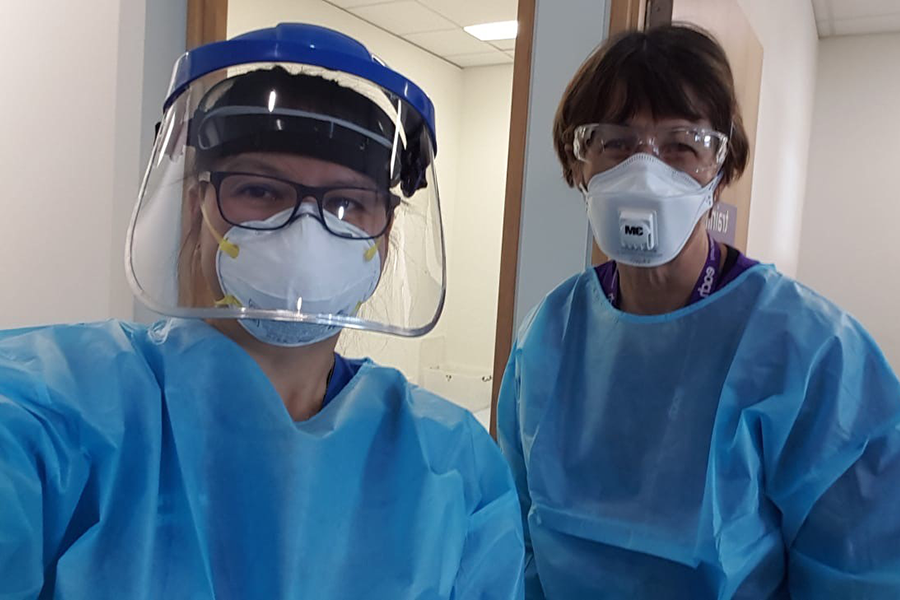Merilyn (right) with registered nurse Alison Lin
Merilyn Spratling FACN works at EACH, a community health centre in eastern Melbourne. She is a Refugee Health Nurse Practitioner (NP) and coordinates the EACH Refugee Health (Nursing) Program, a role she has been in for the last 11 years.
There are 15 community health centres that deliver the Victorian Department of Health and Human Service’s (DHHS) Refugee Health Program. Refugee Health Nurses are important members of each of these programs and provide initial assessments and support for people of refugee backgrounds arriving in Australia on humanitarian or other types of visas. “We provide a comprehensive initial refugee health assessment and then refer them to services they need which are identified during the nursing assessment. For example, people are referred to general practitioners (GPs) including the GPs at EACH. Our work helps prevent newly arrived people falling through the health care gaps,” Merilyn explains.
As Melbourne goes through yet another period of strict lockdown restrictions, the general feeling is that of constraint, says Merilyn. “In a way, it feels worse to be in a lockdown a second time, not just because the number of people who have contracted COVID-19 is higher, but also because we were just starting to experience some freedoms.”
Due to COVID-19, there has been a significant impact on the services that Merilyn’s organisation provides for refugees and people seeking asylum. “We obviously haven’t had any refugees arriving since international travel was restricted months ago. We know though that there are many refugees who have humanitarian visas for Australia, waiting in ‘transit’ countries such as India or Malaysia where there is a high risk of infection. Refugee Health Nurses are very concerned about the health and ongoing welfare of people waiting to come to Australia.”
She adds that the anxiety and depression that stems from lack of access to resources, gets compounded in this environment. “Refugees and asylum seekers often have trouble navigating our health system; poor health literacy is just one reason for this. Sometimes people can’t understand medical information even though it has been translated in various languages. They really need our support.”
Currently, Merilyn’s work is concentrated in the COVID-19 clinic. “My organisation has received funding from the Commonwealth and Victorian Governments to provide COVID-19 screening clinics across the Eastern region. As a nurse practitioner, I work in a team to provide the initial screening and write the pathology request forms. I can also undertake the PCR (polymerase chain reaction) swab test when needed such as when I work in smaller outreach clinics with less numbers of people.
During the course of this lockdown, however, the bigger challenge is “accessing vulnerable groups and helping them to get tested if they are sick”, she says. “We need to assure them that they can access services that are culturally appropriate and geographically convenient. EACH also has a mobile service and we’re reaching out to vulnerable communities now, for example we have done a couple of sessions with the mobile clinic at one of the local refugee churches. Some people have waited for testing because they prefer getting screened in smaller clinics rather than larger hospitals or respiratory clinics. This is sometimes because they believe they will catch the virus in bigger facilities. Some also don’t know how to call the COVID-19 hotline even though there are interpreters who can help them,” Merilyn explains.
She says that it would be very helpful if health care workers had data, which identifies vulnerable groups within the community that might need extra support and education to access the clinics.
Merilyn, who can see up to 100 patients in the COVID-19 clinic each day, says the work is challenging but satisfying. “Being an NP in the COVID-19 clinic, working with an amazing team of RNs, GPs, managers and administrators has again enabled me to work in an extended role within my scope of practice. What this pandemic has enabled NPs to again demonstrate is their ability to do so much more. People get really surprised when I tell them that I am doing this role because I am a Nurse Practitioner. It’s been great and I hope to be able to help people as best as I can in this role, now and going forward.”





